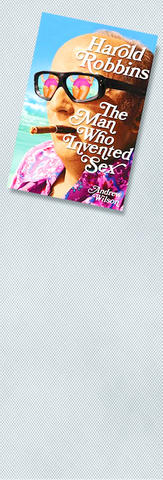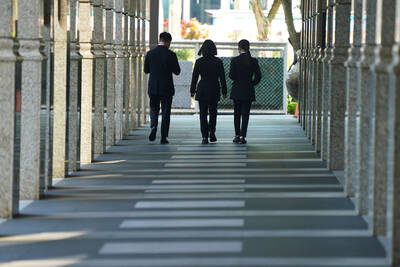Here is a specimen of Harold Robbins' infamous prose style, beloved by any teenager who ever had a copy of The Carpetbaggers and a flashlight: "Little did she realize that, while the relationship would satisfy many of her wildest fantasies - traveling the world, socializing with the rich and famous, enjoying a gilded lifestyle of yachts, champagne and caviar - the dream would turn into a depraved nightmare of orgies and drugs, and ultimately a broken marriage."
And here's the catch: This isn't Robbins' work. It isn't even fiction. It's a campy sentence by the otherwise more straightforward Andrew Wilson, Robbins' biographer. It's about Robbins' second wife, Grace, the one who swanned around the Aegean Sea wearing 14-karat gold fingernails, as befit her husband's sense of quiet decorum.
Robbins has been called many things: Godfather of the airport novel, the P.T. Barnum of the book business and the Thrill Peddler are some of the catchier ones. So Wilson clears his first hurdle by coming up with Harold Robbins: The Man Who Invented Sex as his own handy way of characterizing his subject. That label isn't strictly accurate, except in its echo of Robbins' nonstop braggadocio. "There's no question about it - I am the best there is," he once said, apparently with a straight face.

Wilson's biography is a slight but interesting book for anyone who wonders what set of circumstances produced Robbins and his wild imagination. This entrepreneurial novelist was canny enough to realize that his vast reading public would not be receptive to the real facts about his life, and in any case Robbins liked to lie about them. The tall tales about his childhood featured early years in an orphanage, adoption and a stint in the Navy that left him the only survivor of a torpedoed submarine.
Wilson discredits all this and instead emphasizes that the young Robbins - who was born Harold Rubin in 1916 to a mother who died five days later - had a flair for number-crunching. After glamorous early work selling sodas, packing boxes and bookkeeping, "he never forgot the skills he had learned as a grocer, statistician and budget analyst, balancing the time and effort he expended on an enterprise with the amount of money earned."
What Robbins actually invented was not sex but a formula for whipping sex, sadism and gossip into a hugely marketable product. As one reviewer summarized the formula: "Who is that masked celebrity climbing into the king-size bed?"
Typical Robbins: "A sick feeling began to come up in her throat. This could not be her. Not like this. Nude. With that woman and those men."
From the very start (Robbins began writing his first publishable novel in 1942) this stuff attracted attention. Prescient publishing executives knew it could ignite a whole new public appetite for pulp fiction. Even the lofty Alfred and Blanche Knopf had to deal civilly with Robbins (and go to court to establish that his books were not obscene) after their son acquired the rights to a Robbins book while his parents were on vacation. Eventually, Simon & Schuster's Pocket Books would create a special imprint, Trident Press, as the pole with which it could touch Robbins.
At first he liked to write almost as much as he liked to make money. Eventually the writing became more of a nuisance.
"We structure the deal first, and then Harold worries about the writing," his lawyer said in 1967, when Robbins was on top of the world and largely indifferent to the rest of it. Neither the Vietnam War, the moon landing nor Woodstock would interest him as much as his yacht and villa in the south of France, or the pimp-style wardrobe that he favored while giving parties. Friends pad this biography with endless accounts of how Robbins "knew how to live the good life."
One notable nonfan: Michael Korda, who actually had to edit Robbins' manuscripts. It bothered Korda that the first half of a Robbins book might not match the second if the drug-addled author took time off between payments and then cranked out new chapters without reading the old ones. Eventually Robbins got sloppy enough to have two teenage girls swooning over a James Dean Rebel Without a Cause poster without knowing that by the time that film was released, Dean was dead.
"Although people talked about Harold's generosity and kindness to his friends, I must say that in the years when I knew him I never saw that side of his personality," Korda says here. "I saw an abrasive, disagreeable, aggressive, challenging man who was someone you'd run a mile to avoid. He was as disagreeable and odious in the days of his success as the days of his failure." That failure was so extreme that it has been called "my nightmare" by Stephen King, who knows a thing or two about bad dreams.
In 1982, Robbins suffered a minor stroke that produced aphasia and made it impossible for him to write clearly. His personal assistant and later his third wife, Jann Stapp ("If I hadn't harassed her, we'd never have married"), began to clean up his writing. Sales dropped. Imitators arose. And then poetic justice kicked in: A cocaine-induced seizure caused him to fall and break his pubic bone and hip. Now in a wheelchair, using prescription drugs instead of recreational drugs, Robbins could no longer visit or even afford his homes in hard-to-reach places.
His income shriveled. His debts mounted. So did the horror. "Wizened and shrunken, he spewed out profanities like a court jester with Tourette's syndrome" and died in Palm Springs, California, a place he hated. His ashes remain there in his ultimate literary monument: a book-shaped urn with his name on its spine.

JUNE 30 to JULY 6 After being routed by the Japanese in the bloody battle of Baguashan (八卦山), Hsu Hsiang (徐驤) and a handful of surviving Hakka fighters sped toward Tainan. There, he would meet with Liu Yung-fu (劉永福), leader of the Black Flag Army who had assumed control of the resisting Republic of Formosa after its president and vice-president fled to China. Hsu, who had been fighting non-stop for over two months from Taoyuan to Changhua, was reportedly injured and exhausted. As the story goes, Liu advised that Hsu take shelter in China to recover and regroup, but Hsu steadfastly

Taiwan’s politics is mystifying to many foreign observers. Gosh, that is strange, considering just how logical and straightforward it all is. Let us take a step back and review. Thanks to the Chinese Nationalist Party (KMT) and the Taiwan People’s Party (TPP), starting this year people will once again have Christmas Day off work. In 2002, the Scrooges in the Democratic Progressive Party (DPP) said “bah, humbug” to that. The holiday is not actually Christmas, but rather Constitution Day, celebrating the enactment of the Constitution of the Republic of China (ROC) on December 25, 1947. The DPP and the then pan-blue dominated legislature

Focus Taiwan reported last week that government figures showed unemployment in Taiwan is at historic lows: “The local unemployment rate fell 0.02 percentage points from a month earlier to 3.30 percent in May, the lowest level for the month in 25 years.” Historical lows in joblessness occurred earlier this year as well. The context? Labor shortages. The National Development Council (NDC) expects that Taiwan will be short 400,000 workers by 2030, now just five years away. The depth of the labor crisis is masked by the hundreds of thousands of migrant workers which the economy absolutely depends on, and the

If you’ve lately been feeling that the “Jurassic Park” franchise has jumped an even more ancient creature — the shark — hold off any thoughts of extinction. Judging from the latest entry, there’s still life in this old dino series. Jurassic World Rebirth captures the awe and majesty of the overgrown lizards that’s been lacking for so many of the movies, which became just an endless cat-and-mouse in the dark between scared humans against T-Rexes or raptors. Jurassic World Rebirth lets in the daylight. Credit goes to screenwriter David Koepp, who penned the original Jurassic Park, and director Gareth Edwards, who knows